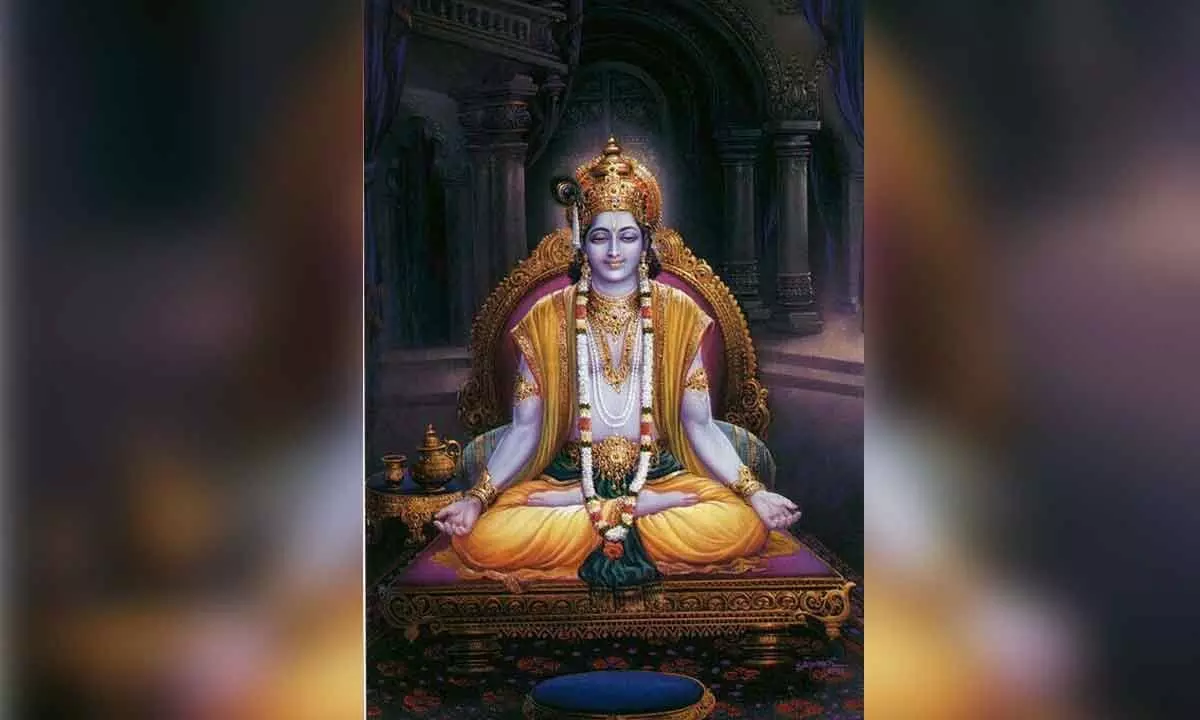Live
- Excise police seize 10 litres of adulterated liquor
- AAP workers protest outside BJP leader Parvesh Verma's residence; latter distributes snacks
- I'll move the High Court, want written reply why I'm not getting Khel Ratna Award: Yogesh Kathuniya
- Malladi Venkata Krishnamurthy Lauds 'Master of Suspense Hitchcock'
- ACB hands over key documents to ED in the Formula E car race case
- How to Use Meta AI on WhatsApp for Creative Interactions
- FIIs remain net investors in India this year amid robust economy, resilient market
- Telangana government grants extended timings for pubs and parties on the eve
- Beed sarpanch murder: Kin, Maha Oppn parties, social groups take out silent march
- UAE Tops Global Mobile Internet Speeds; India Ranks 25th Worldwide
Just In
Social Consciousness: Intensive Thinking Is Tapas


A good analysis of tapas is given in the Gita. A good character is given the status of tapas by Krishna. Three verses explain this by examining our interaction with the world, which is in three ways – by body, by speech and by mind. The tapas by body is such as respecting elders, honesty in matters of wealth, sexual continence and non-violence (17-11). Tapas by speech is to speak in an inoffensive, truthful, and helpful way and in the light of scriptures (17-12). Tapas by mind is such as having inner peace (by eschewing hatred), gentleness, self-control, and purity of mind (17-13)
In mythological tales, we see demons perform great tapas. Brahma, the creator, appears and gives even unreasonable boons to them. The demons get empowered and begin to control all the resources on earth. They drive the gods away from heaven and torture good people. On the plea of gods, Vishnu takes birth and restores order, by killing the demon or by restraining him as in the case of Bali.
We wonder why Brahma should give boons at all and cause trouble to the world. Well, Brahma is like the law of nature. For every action there is a result. Etymologically, tapas means ‘thinking’. Tapas is an intense intellectual effort by a person. The sages performed tapas by aligning their will with the cosmic will and did good for mankind. The law of nature being value neutral, a good or evil person would get the result. Even the demon gets the result.
A good analysis of tapas is given in the Gita. A good character is given the status of tapas by Krishna. Three verses explain this by examining our interaction with the world, which is in three ways – by body, by speech and by mind. The tapas by body is such as respecting elders, honesty in matters of wealth, sexual continence and non-violence (17-11). Tapas by speech is to speak in an inoffensive, truthful, and helpful way and in the light of scriptures (17-12). Tapas by mind is such as having inner peace (by eschewing hatred), gentleness, self-control, and purity of mind (17-13).
A more important way of examining tapas is from the point of the three gunas – sattva, rajas and tamas. Krishna explains in three verses. Earnest thinking, not motivated by selfish gain but for welfare of humanity is tapas of sattva mode. Tapas with the motive of getting honors or praise or for ostentation is tapas of rajas mode. Tapas (scientific research) done in a vindictive way to harm others is tapas in tamas mode. The story of Viswamitra having rivalry with Vasishta and performing tapas is a good example of the three levels of tapas. Initially he does tapas to destroy Vasishta. Later he obstinately tries to create a second heaven by spending his powers of long years of tapas. Finally, when he conquers anger and does tapas in a sattva mode, he becomes a real sage. The creator Brahma appears and grants him the status of a great sage.
Thus, the world is at the mercy of thinkers, with good or bad motives, toiling hard and developing ideas or technology which may help or harm humanity. Covid 19 taught us lessons of the dangers of such evil experiments by scientists advancing the agenda of rapacious governments. AI and chat GPT are posing questions whether machines would enslave man.
A couple of days ago an American film ‘Oppenheimer’, got released. It is a biographical thriller on Oppenheimer, the maker of the atomic bomb. When the bomb was tested, he is said to have exclaimed quoting a line from the Gita, ‘I am death, the destroyer of all’.
After the bomb was used in Japan, he was a dejected man who worried about the very preservation of humanity from dangers of technology. The fruit of his tapas had gone into an imperial system, and he was helpless. His views were ignored by the atomic energy commission, and he was stripped of his position, though he continued to teach in Princeton advocating arms control. But will any lessons be learnt? Tapas is associated with power, as in the case of the demon kings of old. World peace is resting precariously on the balance of terror maintained by the demonic powers.
(Writer is former DGP, Andhra Pradesh)

© 2024 Hyderabad Media House Limited/The Hans India. All rights reserved. Powered by hocalwire.com






